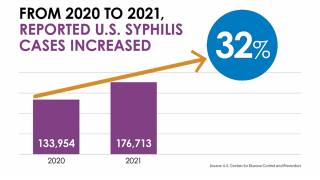Syphilis Vaccine Patent Granted to Canadian Researcher

A Canadian microbiologist has been awarded a patent for a vaccine candidate against syphilis.
Syphilis is caused by the bacterium Treponema pallidum. The protein vaccine component that has been patented aims to prevent this bacterial disease from entering the bloodstream.
Syphilis is unique among sexually transmitted diseases in that it remains curable with a single dose of penicillin, with no documented risk of resistance, formulated for this purpose is long-acting Benzathine Penicillin G.
But, there is not a vaccine available to prevent syphilis.
“The pathogen that causes syphilis can pass from the bloodstream into the brain and from a pregnant woman to her fetus,” said University of Victoria microbiologist Caroline Cameron.
“This makes it one of the leading causes of infectious stillbirth in low-income countries, leading to over 205,000 fetal and newborn deaths globally each year, said Cameron.
Cameron is collaborating with researchers at the University of Washington and the Infectious Disease Research Institute with the goal of developing a vaccine composition that incorporates this patented protein component.
**** Find a clinical trial in 60 seconds ****
Worldwide, there are an estimated 11 million cases of syphilis each year, and rates of the disease in British Columbia are at their highest in 30 years.
WHO guidance, as part of the global metric goal for the elimination of mother-to-child transmission of syphilis, recommends that 95% of pregnant women who receive prenatal care should be tested for syphilis, and 95% of those women diagnosed should be treated.
Sexually transmitted infections (STIs) are among the most common acute conditions in the world. There are over 30 infections that can be transmitted sexually, says the World Health Organization (WHO).
Estimates of the global prevalence and incidence of chlamydia, gonorrhea, trichomoniasis, and syphilis in adult women and men remain high, with nearly one million new infections with curable STI each day.
Syphilis infection occurs in stages with each stage associated with different symptoms. Syphilis alternates between times when it is active and inactive (latent).
If a woman is pregnant and has syphilis, she can give the infection to her unborn baby. Having syphilis can lead to a low birth weight baby. It can also make it more likely you will deliver your baby too early or stillborn, says the WHO.
An infected baby may be born without signs or symptoms of the disease.
However, if not treated immediately, the baby may develop serious problems within a few weeks. Untreated babies can have health problems such as cataracts, deafness, or seizures, and can die.
Additionally, syphilis causes increased susceptibility to HIV, and when untreated cause irreversible tissue damage, says the WHO.
Previous research published in Nature during 2017 reported evidence that Tp0751 is a promising syphilis vaccine candidate.
“A vaccine would provide an effective tool against the global fight against syphilis when added to prevention, screening and treatment programs,” says Cameron. Professor Camero’s Email: [email protected]
The University of Victoria has approximately 140 active patents and has been granted seven patents for innovations since the start of 2018.
Funding for the project is provided by the US National Institutes of Health.
Our Trust Standards: Medical Advisory Committee

























